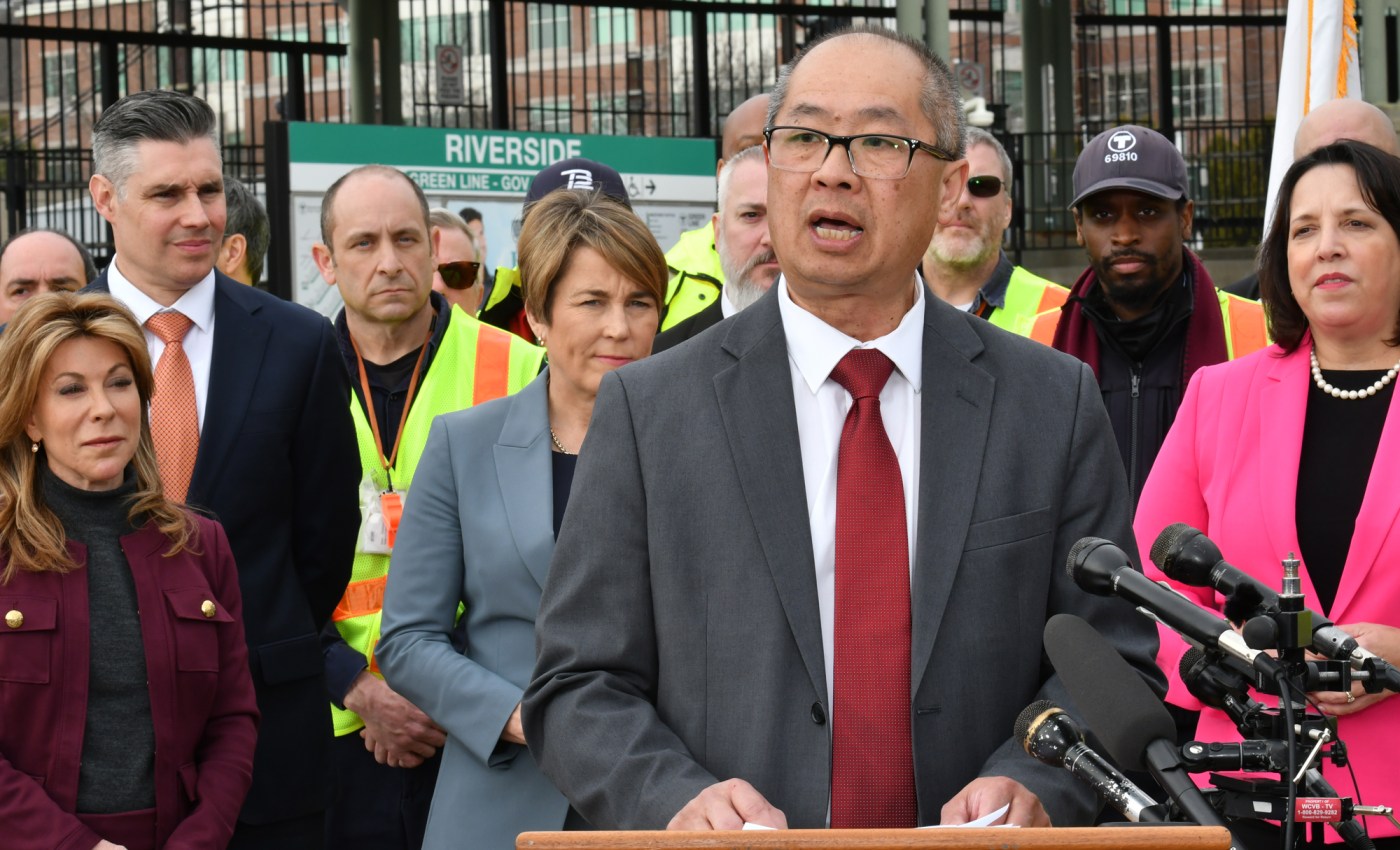
300-plus buyouts paid out to MBTA workers, including those let go
Three MBTA managers revealed to be living hundreds of miles away, and often working remotely, were among more than 300 agency employees who received buyouts last year, according to state payroll records confirmed by a T spokesperson.
State payroll records list the three former employees, Karli Del Rossi, chief of staff for capital programs; Charles Thorn, deputy chief of capital programs; and Maysoon Ishtar Tawfik, chief of capital programs strategy and innovations, as having received buyouts at the end of their employment in late 2023.
“These three individuals are no longer employed by the Authority,” MBTA spokesperson Gabrielle Mondestin said Monday in an emailed statement.
The departure of those three capital programs employees follows the March 2023 firing of James “Jay” Neider, chief of capital programs for the MBTA, a personnel change confirmed by a Gov. Maura Healey spokesperson at the time. Neider owns homes in Millsboro, Del., and Gilbert, Ariz., property records show, and according to a prior Boston Globe report, also spent a lot of time in Hawaii and Wisconsin.
“We actually removed one individual,” Gov. Maura Healey said last April. “And there will be other changes.”
The T’s statement did not specify the specifics of the recent separations regarding whether the three employees quit or were terminated, but Thorn, who owns a home in Maywood, N.J., told the Herald that he was fired.
Thorn made $174,000, after starting mid-year, in 2022, but was hired at an annual rate of $232,000. He was paid through Dec. 16, 2023, taking in $227,939 of that salary last year, according to the state Comptroller’s office.
He received roughly $1,533 in buyout pay — $429 in 2023 and $1,104 in 2024 — state payroll records show, which he said constituted his unused vacation time.
Thorn, along with Del Rossi and Tawfik, were told last spring by the T that “they needed to be in the office three days a week,” a T spokesman said at the time.
Del Rossi, who owns a home in Bonita Springs, Fla., according to land records, was paid through Sept. 23, 2023, earning $112,772 of her $146,080 annual rate, the state Comptroller’s office states. Payroll records show she received a roughly $540 buyout last year.
Tawfik, who has a home in Manhattan, N.Y., according to land records, was paid $210,207 of her $237,591 annual rate through Dec. 16, 2023. Tawfik’s buyout was much larger than her two former colleagues, however, at just shy of $22,000 — she was paid roughly $439 in 2023 and about $21,560 this year, payroll records show.
The three were among the more than 300 MBTA employees who received buyouts as part of their departures last year. Those amounts range from as little as $64 for a bus driver who was paid $25,026 and departed in October, to as high as $48,346 for a deputy police chief who was paid $162,627 and left the T in September.
Among the buyouts are former General Manager Steve Poftak, who stepped down in January 2023 and received $32,128; Neider, the terminated chief of capital programs, who was paid $41,343; Angel Peña, the chief of capital transformation, who said in October that was he leaving the T to be closer to family in Texas and received $40,903; and Ronald Ester, the former chief safety officer who resigned in August and was paid $22,736, payroll records show.
In keeping with the governor’s call for further leadership changes last spring, following the revelation of multiple out-of-state managers, General Manager Phillip Eng made a number of executive-level changes early into his new role, which began last April.
In September, Eng also announced a major personnel shakeup, shuffling around top leaders in key positions as part of an effort to restructure the agency under four divisions, amid renewed scrutiny from federal regulators, according to an internal email sent by Eng at the time.
A T spokesperson said, however, when asked about the high number of buyouts, 308 in 2023, that the MBTA “does not buy out contracts from at-will employees,” and “did not expend additional funds or use financial incentives to encourage these individuals to end their employment.”
The buyout section on the state Comptroller’s website, the T said, is “typically the payment of unused vacation leave, regardless of the separation being voluntary or involuntary.” The law requires that departing employees be paid their earned, unused vacation time, a T spokesperson said.
As for the three out-of-state managers who have since left, Del Rossi, Tawfik and Thorn, a T spokesperson said, “The MBTA has not made a specific effort to buy employees out of employment.”
Thorn stated that while his dismissal letter did not pertain specifically to his adherence, or lack thereof, to last spring’s directive to work in Boston more often, it did list “insubordination” as a reason. That, he thinks, stemmed from his decision not to comply at times with, and challenge what, according to him, never became a formal written policy.
A T spokesperson refuted that assertion, however, saying that the agency “officially” has a hybrid work policy in place for most administrative staff. Those who qualify for hybrid work are expected to be in the office “an average” of two to three days a week. “Most executives opt to be in person more than not,” the T said.
Phone calls and messages left with the numbers listed for Del Rossi and Tawfik were not returned.
Thorn, 48, said he complied with the three-day-a-week directive in April and May of 2023, but resumed his prior schedule of coming in roughly five days a month in June and July. In August, he started to come in three days a week again, he said, which lasted through the time of his dismissal, in early December.
He was also told that his position was being eliminated through a reorganization, and that there had been a human resources complaint on file, pertaining to subordinate employees who had issues with how Thorn conducted himself, he said.
Related Articles
MBTA 2023 complete payroll: Your Tax Dollars at Work
MA public payroll: ‘Your Tax Dollars at Work’ 2023 database home
Ultimately, though, Thorn said he feels like he was pushed out “by unlawful means of intimidation, retaliation and discrimination,” following last spring’s media coverage.
Thorn sees himself as a “scapegoat,” saying that he wasn’t aware of issues with his employment before the news hit, and that he worked remotely in New Jersey for the first 12 months of his job “with no one taking exception to that.”
He said that while many jobs at the T, such as for operations and maintenance, require an in-person presence, his position was one that he could do largely remotely — aside from in-person interaction with his staff and site visitation.
“Quite honestly, I feel like this was a bait and switch with the public,” Thorn said. “I feel like the new administration and our new leadership at the T was biding themselves time to figure out some of the issues that needed to be solved. And this was a distraction — to be able to say, hey reporters and others saying, hey, no wonder the T is having issues. They have employees that live so far away.”
“It had nothing to do with the actual truth of what was troubling the agency,” Thorn said, adding that he decided to tell his side of the story because, “I think the public deserves the truth.”
The MBTA paid out 300-plus buyouts last year, the agency said was for unused vacation or sick time. (Matt Stone/Boston Herald)


